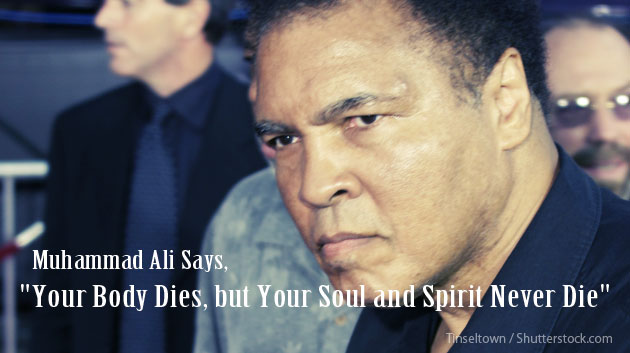Muhammad Ali Says, “Your Body Dies, but Your Soul and Spirit Never Die”
Muhammad Ali, the former heavyweight champion of the world, died of septic shock last week at 74. He had been suffering from Parkinson’s disease. U.S. President Obama mourned his passing, saying, “We are grateful to God for how fortunate we are to have known him, if just for a while; for how fortunate we all are that the Greatest chose to grace our time.”
He is joined by many people throughout the world also mourning the death of this boxer who not only left his mark on boxing history, but touched the world.
Float Like a Butterfly, Sting Like a Bee
He had a career record of 56 wins and 5 losses in 61 fights. Heavyweight boxers at the time were very traditional, simply beating each other with all their might, but Ali was different. With his fancy footwork and fast jabs, he reached a milestone by winning the world heavyweight title three times. His fighting style was likened to his self-proclamation of, “Float like a butterfly, sting like a bee.”
Many Japanese people may be reminded of the martial arts championship of the world held at Tokyo’s Nippon Budokan in 1976, in which Ali fought against the Japanese professional wrestler, Antonio Inoki.
Ali’s Fight Against Racism Outside of the Ring
His “fights” outside of the ring also left an impression on us.
In the 1960s when Ali began to fight in the ring, there was persistent discrimination against Afro-Americans in the U.S., and the country was in midst of the Civil Right Movement led by Martin Luther King.
Ali won the gold medal at the 1960 Summer Olympics in Rome at only 18 years old. Despite his achievement, when he went to a restaurant in his hometown, he was refused service because of his race. He represented his country with honor in the Olympics, but he still faced discrimination instead of being acknowledged for his victory by the public. It must have caused immeasurable suffering.
In the same year, the Vietnam War started. Ali refused to be inducted into the U.S. Army, saying, “No Viet Cong (the guerrilla force of People’s Liberation Armed Forces of South Vietnam) ever called me nigger. I have nothing against the Viet Cong. I am not going 10,000 miles to help murder and kill other poor people.”
Consequently, he was convicted of neglecting his obligation to serve in the military. Ali was stripped of his title and license to fight, and banned from boxing.
Then the Supreme Court of the U.S. overturned Ali’s conviction, allowing him to return to the ring. In 1974, Ali fought George Foreman whom people called a “hard puncher who could knock down an elephant”. Everyone said that the odds were in favor of Foreman, but Ali knocked him out, making a remarkable comeback as a champion.
Ali’s Faith as a Muslim
We are impressed not only by how strong Ali was as a boxer, but also by the inner strength that he showed when he fought against racism. Ali’s inner strength seems to come from his faith in Islam.
Ali joined the Black Muslims in 1964 and changed his name from Cassius Clay to Muhammad Ali. In a TV program he described his view of life and death as follows:
“The body gets old. You don’t have teeth. Your hair is leaving you. Your body gets tired. But your soul and your spirit never die. So your body is just housing your soul and spirit. (snip) The most important thing of your life is what’s going to happen when you die. (snip) Get myself ready to meet God and go to the best place.”
(URL:http://www.youtube.com/watch?v=YEYm4vHQCWo)
He believed that the world after death existed and that every human being has a soul. It is because of this faith that he could rise up over again and again without yielding to racial discrimination.
Ali is not the only athlete who believes in the existence of God and life after death.
Neymar, a professional footballer who plays for the Brazil national team is Christian, and according to Christian Today (the 2015, June 17th issue), he always calls his father before he gets on the field and recites a prayer with him. Likewise, Kaka, who plays with him as a teammate for the Brazil national team, is a devout Protestant.
Paying attention to the religious values of athletes as well as their abilities will provide you with a different perspective in watching sports and give you insight into the drive that makes for a champion.



















